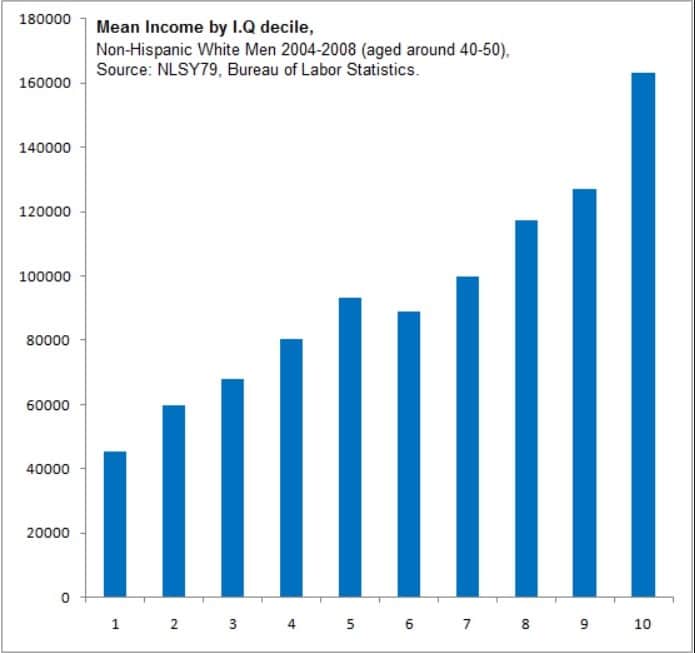Currently Empty: $0.00
The Benefits and Drawbacks of Having a High IQ in Today’s World
Many people have lofty goals and want to be as successful as historically prominent individuals like Newton and Einstein. Some people believe having a high IQ is the key to realizing their full potential and succeeding extraordinarily well. They think that if they had a higher IQ, they could figure out how to solve challenging mathematical problems, find treatments for life-threatening illnesses, or create ground-breaking new technologies. While a small percentage do achieve great success, most fall short of these high standards and frequently blame their perceived shortcomings on a lack of intelligence. This conviction supports the idea that they could’ve overcome their difficulties if they had a higher IQ. However, even though high IQ isn’t a prerequisite for life or work success per se, it’s beneficial, and individuals who possess it have better chances of becoming overachievers.

What’s IQ and How It’s Measured?
We must first define a high IQ before we can assess the disadvantages and advantages of intelligence and a high IQ.
The intelligence quotient, or IQ, has long been used as a standard to gauge intellectual capacity and human potential. Proficient comprehension of intricate ideas, career accomplishment, and high IQ scores are frequently linked. High-IQ people are frequently portrayed by the media as giants of intellect who can solve problems, innovate greatly, succeed in the workplace, and easily handle difficult school assignments.
Intelligence level is measured via the IQ Test International and similar IQ tests. What’s an IQ that’s considered high? An intelligent person with an IQ of 115 or more is said to have a high IQ. Merely 15% of the populace possesses an IQ of 115 or higher.
Joining the International High-IQ Society requires an IQ of 124. This is the starting point for entrance into civilizations with high IQs. At the next level of intellect, 2% of people have an IQ of 130 or above, which is known as “gifted” intelligence. This IQ is two standard deviations above the mean. The Mensa standard is the IQ score on a legitimate, standardized IQ test needed to be admitted as a Mensa member.
You can understand IQ scores as indicators of comparative IQ rankings by using the following table:
| CLASSIFICATION | IQ SCORES | PERCENTAGE |
| Highly gifted | 140+ | 0.4 |
| Mensa members | 130+ | 2 |
| Gifted | 130+ | 2 |
| International High IQ Society members | 124 | 5 |
| High | 115-129 | 15 |
| High average | 110-115 | 25 |
| Average | 90-109 | 50 |
| Low average | 85-89 | 23 |
| Borderline | 70-79 | 8 |
High IQs are seen by many as a direct route to success and accomplishment, which breeds jealousy around them. This leads us to the drawback-related portion of our post.
High IQ Drawback No. 1: Feelings of Unworthiness
People with high IQs indeed have rapid conceptual learning, which, as opposed to the traditional learning concept that ought to be transformed, fosters creativity and critical thinking and enables them to succeed in a variety of disciplines and have satisfying lives that include contributions to society and recognition. They frequently deal with particular difficulties, though, such as a greater likelihood of issues with their physical and mental health.
The weight of excessive expectations can cause feelings of unworthiness, imposter syndrome, and a profound sense of emptiness if people believe their potential is not properly utilized, so having a high IQ doesn’t ensure pleasure or success.
High IQ Drawback No. 2: Restlessness
An ongoing search for cerebral stimulation may also result in restlessness. High-IQ people frequently look for bigger tasks to pique their curiosity, and they may feel disappointed if such stimulation isn’t easily accessible.
Like any muscle, the brain needs regular exercise to stay strong, and those with higher IQs need more difficult intellectual tasks to keep them interested. A feeling of mental stagnation may result from insufficient stimulation.
High IQ Drawback No. 3: Variety of Other Types of Intelligence Ignored
The idea of IQ itself is constrained and debatable. Emotional intelligence, creativity, and social awareness are among the other critical cognitive talents that are often overlooked in favor of measuring logical thinking and problem-solving prowess on IQ tests.
Because of this, IQ levels don’t accurately reflect a person’s overall ability to succeed in a variety of spheres of life. This limited assessment frequently ignores the variety of bits of intelligence that lead to a satisfying and well-rounded existence.
High IQ Drawback No. 4: Social Difficulties
People with high IQs encounter social difficulties as well. Research indicates a connection between social distancing, anxiety, sadness, and high IQ. Because of variations in intellectual ability, gifted people may feel misunderstood by their peers and find it difficult to connect with others, which can cause irritation and agitation.
The emphasis placed by society on traditional academic achievement frequently ignores people who excel intellectually in other domains, such as the arts or sports.
High IQ Drawback No. 5: Success-Target Pursuer Label
Envy and comparison reduce people to mere success-target pursers, undermining their intrinsic value. Society would gain more by appreciating the contributions of every human being and appreciating the worth of various forms of intellect, as opposed to hierarchically viewing intelligence.
By encouraging an inclusive and cooperative culture, we can use humankind’s combined genius to solve urgent global issues.
The Benefits of a High IQ and Intelligence
The benefits of intelligence and having a high IQ include the following:
High IQ Benefit No. 1: The Fitness and Performance of the Brain
Athletes have long understood that scientifically based, focused training improves sports performance. Sporting success has been changed by science. The brain is currently being optimized using the same methodology.
- The brain is a physical organ that can be trained to become more fit and effective, much like other organs or muscles in the body.
- More than simply problem-solving skills make up your IQ. It gauges the general efficiency and fitness of your brain.
As IQ rises, the brain can become more powerful and efficient in two ways:
- The plasticity of the brain – the capacity of the brain to regenerate new connections or brain cells in order to rearrange itself.
- The brain’s energy source – especially at periods of high effort.
Similar to the all-around physical benefits of being physically active, having a smarter brain has advantages for attentional focus, problem-solving effectiveness, learning capacity, and memory. As evidenced by the following research, having a higher IQ also positively impacts health and life expectancy:

High IQ Benefit No. 2: Cognitive Capital in the Knowledge Economy
In his piece “Capitalism and Inequality: What the Right and the Left Get Wrong” published in Foreign Affairs in March 2013, Jerry Muller, Professor of History at the Catholic University of America, claims that we are living in a “cognitive economy” in which intelligence is highly valued. He wrote that the increasing stratification of market rewards and expanding equality of access to education in our day had made human capital even more crucial. Cognitive ability refers to mental agility, the capacity to recognize and apply patterns gleaned from experience, and the capacity to handle mental complexity. Character and social abilities, such as self-control, perseverance, and responsibility, are additional. Thirdly, there is true knowledge. These are all becoming more and more essential for success in the post-industrial economy.
Our general intelligence includes our ability to think quickly, recognize and apply patterns, and handle mental complexity. In our economy, which is focused on knowledge, they are all essential.
In the knowledge economy, having a high IQ helps people for:
- Solving issues at work
- Acquiring knowledge while working
- Flexibility in the workplace
- Ongoing development at work
- Being adaptable at work
This pays dividends in terms of earnings and career advancement, as evidenced by the following data:

High IQ Benefit No. 3: Preventing Cognitive Aging and Cognitive Function Loss
Numerous changes in the body, biology, chemistry, and psychology accompany aging. This phenomenon also applies to the brain. The ability to solve problems and reason, to be spatially aware, and to have short-term memory all often decline with age, especially beyond the mid-40s.

Cognitive decline symptoms include forgetfulness, distractibility, less effective learning, and decreased flexibility and problem-solving ability. This cognitive decline is a normal process. It’s well known that the brain’s grey matter, or dedicated processing circuitry, shrinks as people age, while their white matter, or long-range connectivity, grows in the brain between the ages of 19 and 40 and then starts to diminish after that.
High IQ Benefit No. 4: Getting Rid of Attention Disorders
Symptoms of attention deficit disorders involve forgetfulness, procrastination, disorganization, and easy distractibility. The executive and attentional control systems are compromised in attention disorders. Replicated research has demonstrated the following attention-related cognitive gains from this training (Salminen, T., Strobach, T., & Schubert, T. (2012)):
- Attentional switching between two sets of data related to distinct tasks is known as multitasking.
- Focusing on fresh, pertinent things while averting attention from unnecessary ones.
- Protecting against information tampering.
- Decreased ADHD symptoms.
- Enhancements for victims of frontal lobe stroke.
Conclusion
In conclusion, a closer examination of the nuances of intelligence and its social significance is prompted by the query of whether or not having a high IQ is genuinely envied. While having a high IQ has some benefits, there are also big drawbacks. Along with academic prowess, emotional intelligence, flexibility, and the capacity to find enjoyment in a variety of situations are all necessary for a successful existence.





